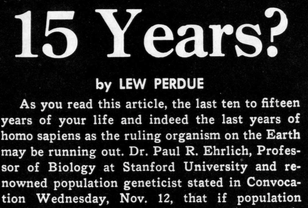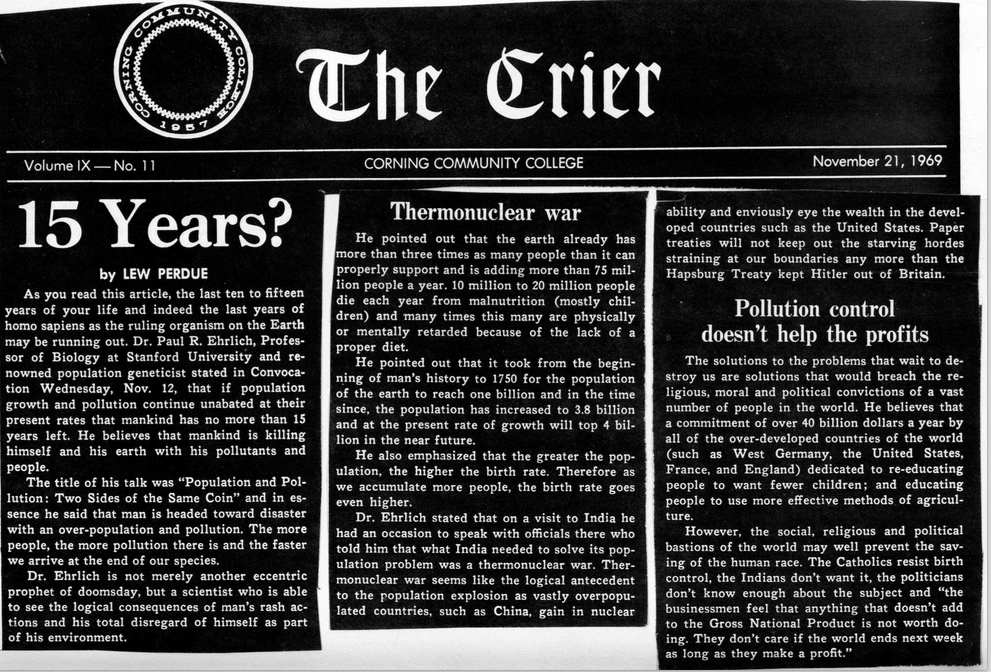Paul Ehrlich made me a skeptic.
Not about climate change, but skeptical of over-the-top science activists and their imminent doomsday predictions.
Paul Ehrlich made me a skeptic of all true-believers. The article below was the start of that because it made me a true believer, something I later learned to be ashamed of.
But, in 1969, I totally bought into Ehrlich’s shrill warning that the human race probably would not be around by 1984.
As editor of the campus newspaper, I wrote a lengthy, front-page article taking up Ehrlich’s Jeramiad. A full copy of that article can be found here.
And like so many others, I read Ehrlich’s manifesto — The Population Bomb with the same zeal as fundamentalists read the Bible.
I wrote that Ehrlich-inspired eco-propaganda piece the year before I entered Cornell University as a biology major with an emphasis on ecology, evolution and systematics.
I carried Ehrlich’s message close to my heart, became a disciple of sorts. Many others bought into the literal interpretation
Reality Reared Its Ugly Head
I worked my way through college having been on my on since I was 18.
The need to earn a living while earning my degree probably made me confront reality a bit more squarely than my classmates.
That was because the work I did — as a full-time newspaper reporter — threw me headlong into the world’s realities and quickly taught me to be skeptical.
“Trust but verify” became my new interface with reality.
This ad-free article is made possible by the financial support of the
Center for Research on Environmental Chemicals in Humans: a 501(c)(3) non-profit.
Please consider making a tax-deductible donation for continued biomedical research.
Ehrlich Violated The “Trust But Verify” Maxim
Even before 1984 arrived in pretty much the same shape as 1969, I had begun to doubt that the 15-year rule had any basis in reality.
I had trusted Ehrlich, but nothing could be verified.
His statement was pure hyperbole something that inspired followers to join him in a cause backed by great personal believe and weak shreds of science. I had worked as a scientist and gotten top grades (like an A+ in organic chemistry), so I understood the science.
I have no doubt that Ehrlich believed his own predictions. Sincere faith is strong even when it is at odds with science and reality.
But scientific “faith” picks and chooses what it needs to strengthen faith, and elevates information that supports the faith and ignores or downgrades other facts that tend to contradict it.
Question Everything: Especially Those You Agree With
Faith and moral integrity founded on weak science do not offer credible solutions to serious problems. It is easily politicized and deflected ways that can taint science and scientists who stick with what they can prove and others can verify.
I have become an equal-opportunity skeptic: I hold in equal disregard right-wing think tanks, left-wing think tanks, corporate interest groups, activist interest groups.
Having a cause creates a certain blindness that must be acknowledged just like any other conflict of interest.
I am cynical of corporate and regulatory attempts at science (Why You Can’t Trust Corporate & Federal Regulatory “Science”). And I am disappointed, and skeptical, of scientists who become evangelical, polemical and political about their causes.
They may believe that their faith in their cause is the best way to have an effect. But it is a quick route to losing credibility.
Closely connected with this is the arrogance of “don’t argue with me, I am a scientist and you are not.”
The failure to properly explain the science behind climate change and other issues enforces an elitist chasm with the general public who increasingly do not trust scientists.
Prophets, Losses & Climate Change
15 years? Really?
Ehrlich is not the only activist scientist whose doomsday predictions have failed. However, scientific evangelism and arrogance have tainted scientists and science as a whole.
Distrust 0ne, distrust all seems to be the public’s attitude.
Failed prophecies create cynicism and disbelief that keeps people from seriously considering legitimate threats and warnings.
Ehrlich and others who have placed scientific “faith” over solid science have created a “catastrophe fatigue” among the general public and a general attitude of dismissal, denial or hostility. You can’t cry “wolf” this often and not suffer the consequences.
Ehrlich was my reason for doubting anyone with an axe to grind or a cause to promote.
I believe many others have been disillusioned in similar ways. That disillusion has resulted in a widespread distrust of scientists.
Links On Public Distrust Of Scientist
- Politics, science, and public attitudes: What we’re learning, and why it matters
- Opinion Differences Between Public and Scientists
- Scientists Are Not Trusted By Americans – Here’s Why
- Perceptions of Science: Hubris and Public Distrust


Comments are closed.